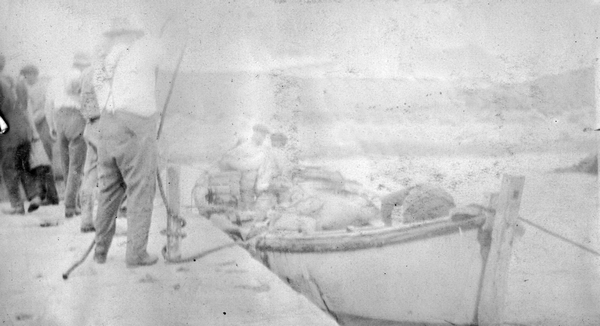Getting the wool to market: Flat Point, 1920s
 |
The Flat Point Station bullock team pulls a dray carrying a woman and four children - 90-017/703
|
The isolation and lack of effective road and rail systems meant that for many farms and sheep stations wool was the number one product. The coastal shipping network was the most effective form of transport, used to take wool to market and to receive supplies.
Bullock teams were widely used: they were strong, could move large loads and their cloven hooves enabled them to cope with muddy roads which turned to a quagmire in winter. As well as moving wool, bullock teams--led by a "bullocky"--were used in milling native timbers and other agricultural activities.
Flat Point bullock team - 05-60/31.digital
The exposed coast at Flat Point was navigable only by small boats so steamers waited offshore while surf boats rowed the cargo from the jetty to the steamer. In the above photo the bullock team is hauling the wagon with the wool bales alongside the jetty where it was unloaded. - 05-60/8.digital
The bullock team and wagon-load of wool bales alongside the jetty being unloaded. Further along the jetty the surf boat is being loaded with bales. 05-60/26.digital
The surf boat alongside the jetty, being loaded with wool bales - 05-60/7.digital
A surf boat laden with bales leaves the jetty for the steamer--some way off-- which can be seen on the horizon between the two men. 05-60/9.digital
This 1920s photo of the reef at Flat Point highlights the ruggedness of the coast. 05-60/17.digital
Rolling a wool bale into the surf boat. 05-60/21.digital
Bales lined up along the jetty awaiting shipping. 05-60/24.digital
This photo suggests that the tide may have dropped which meant the surf boat wasn't able to come alongside the jetty. It appears the bales would have had to be carried from the end of the jetty to the waiting boat. 05-60/27.digital
In this photo a team of horses and a cart is alongside the jetty. It is unclear whether this team was used to transport wool bales. In the background the surf boat can be seen, together with the steamer waiting offshore. 90-017/994
Source:
Picture Wairarapa (Wairarapa Archive)












Comments
Post a Comment